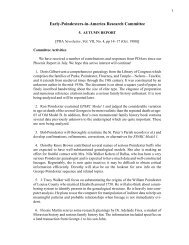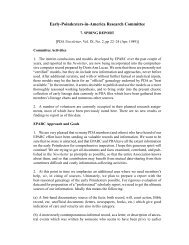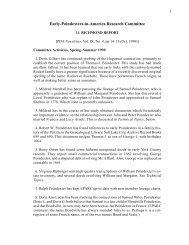new members - Poindexter Descendants Association
new members - Poindexter Descendants Association
new members - Poindexter Descendants Association
You also want an ePaper? Increase the reach of your titles
YUMPU automatically turns print PDFs into web optimized ePapers that Google loves.
POINDEXTER POINDEXTER POINDEXTER DESCENDANTS DESCENDANTS DESCENDANTS ASSOCIATION<br />
ASSOCIATION<br />
ASSOCIATION<br />
OCTOBER OCTOBER 2007 2007 NEWSLETTER<br />
NEWSLETTER<br />
NEWSLETTER<br />
marriage, own or act as agents for most of Hawaii's sugar plantations. At the turn of the century James D.<br />
Dole, no islander but a second cousin of Patriarch Sanford, came out from Boston, and started the<br />
pineapple business which made him many a million. After suffering huge losses in 1931 and 1932, his<br />
Hawaiian Pineapple Co. was reorganized, and Castle & Cooke took a hand in its management.<br />
Sugar. Since Hawaii's chief industry is agriculture, since her No. 1 agriculture product is sugar and her<br />
No. 2 product is pineapples, since her chief manufacturing industries are processing sugar and canning<br />
pineapples, there is no doubt about who rules the territory, regardless of who happens to be holding forth<br />
in Iolani Palace. Most of these economic rulers, traditionally Republican, view the New Deal of their<br />
distinguished Democratic visitor with considerable apprehension, if not downright alarm.<br />
Last spring when the Costigan-Jones sugar restriction bill was under consideration, they were<br />
disappointed when President Roosevelt proposed a Hawaiian sugar quota of only 935,000 tons whereas<br />
the average annual production on the island for the last three years has been about 1,000,000 tons. They<br />
were still more chagrined when Congress, after upping the quota of mainland beet-sugar producers<br />
100,000 tons above the President's request, left the quota for Hawaii to be fixed by Undersecretary of<br />
Agriculture Tugwell. In proportioning quotas between Hawaii, Cuba, Puerto Rico, the Virgin Islands, and<br />
the Philippines, Brain Truster Tugwell used the average crops of 1931-32-33 as figures for the other<br />
islands, but based Hawaii's quota on the years 1930-31-32, to Hawaii's disadvantage. Result: Hawaii's<br />
quota was set at 917,000 tons instead of at least 975,000 which she felt was her due. The reason for this<br />
discrimination, many Hawaiians said privately, was Dr. Tugwell's disapproval of the Hawaiian industry's<br />
control by a few rich families.<br />
Tourism. But for one business favor every Hawaiian last week thanked the New Deal which supplied a<br />
traveling President to publicize the territory as a land for tourists. In 1929 nearly 22,000 people sailed<br />
four days and a half across 2,000 miles of Pacific Ocean to see Hawaii's famed hedges of night-blooming<br />
cereus, to lie lazily on its beaches, explore its volcanoes, taste its papaias and mangos, smell its fragrant<br />
pikake blossoms, listen to its ukuleles. For these and like blessings they left $11,000,000 behind, a sort of<br />
thank-offering which the Hawaiians gratefully received.<br />
Eager to be thanked again on the 1929 scale, Hawaii made much of the delights to be offered to President<br />
Roosevelt and to any one else with $150 for round-trip steamship fare. One theme on which territorial<br />
boosters harped heavily: Hawaii is an integral part of the U. S.<br />
Every white, brown or yellow resident who hopes the New Deal will deal the islands four aces instead of a<br />
bobtail flush repeats those words. Hawaii is not a possession of the U. S., like Puerto Rico or the<br />
Philippines, but a territory like Alaska. Unlike Puerto Rico, which keeps all for itself, it pays into the<br />
Federal treasury income taxes, internal revenue taxes, customs' duties, has sent an average of<br />
$5,000,000 a year to Washington for each of the last 34 years. Its tax contribution is bigger than that of<br />
any one of 17 full-fledged states. Geography can be argued against Statehood for Hawaii but not<br />
governmental finances.<br />
The Hawaiians have a word meaning to humor or jolly for a purpose. It is hoomalimali. Last week<br />
President Roosevelt, who can hoomalimali better than most men, was coming to apply his art to their<br />
injured feelings. His hosts had prepared the biggest hoomalimali party on record to get Hawaii out of<br />
the stepchild class.<br />
Thanks to Irene at IreneTH@cal.berkeley.edu for sharing the above information with the RootsWeb <strong>Poindexter</strong><br />
Message Board.<br />
***********************************************************************************<br />
11 of 11





